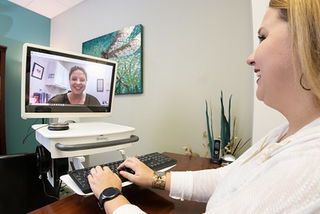Body Language
In-Person vs. Remote Counseling
A debate.
Posted January 29, 2020 Reviewed by Gary Drevitch

With traffic ever-worsening, people ever busier, and free videoconferencing (Skype, Zoom, Facetime) widely available, the idea of remote counseling has grown in appeal. Yet many practitioners mainly or exclusively do sessions in-person, believing it brings major advantages.
Whether you’re a client or a counselor, perhaps this debate will help you clarify your position:
Pro in-person: Being in-person builds the bond between counselor and client. That helps in effecting change. Often, a client is motivated to change, in part, to please the counselor.
Pro-remote: Yes, in-person sessions yield incremental advantage but a skilled practitioner can build deep rapport by phone and especially on video.
Pro in-person: The effort to come to your office increases commitment, making clients more likely to act on what’s accomplished in the sessions.
Pro-remote: Remote clients’ commitment of money and time is sufficiently motivating. Any improvement in efficacy and commitment is typically dwarfed by the hassles of getting to your office. And what if the client has child-care issues? Or is disabled? Or lives in a rural area, with few if any outstanding or well-suited counselors within driving distance?
Pro in-person: Of course, in such circumstances, the advantages of phone or video sessions may outweigh, but we’re talking about situations in which attending in-person doesn’t impose undue liabilities. Another plus for in-person sessions is that it’s easier, even compared with video sessions, to read people’s non-verbals, from the way they walk into your office to the way they walk out.
Pro-remote: You’re reaching. The sensitive counselor can, even on the phone, let alone on video, discern so much about a client, for example, by close listening to what they say, how they say it, and what gets left unsaid. And then there are the subtleties: For example, noticing changes from baseline in the client's voice’s volume and timbre. The efficacy gain in client outcomes is generally too small to outweigh the hassle of getting to your office and especially to outweigh the advantage of clients having far more choices when not limited to local counselors.
Pro in-person: You’re ignoring other factors that are possible only in-person: For example, I routinely offer clients coffee or tea when they come in. Not only does that start things off on a positive note; I have them keep me company while I’m making it. That enables us to start the session informally, which relaxes them and often yields candor.
Another plus that’s possible only in-person: At the end of sessions, I often give clients a little gift. For example, I might let them choose a bottle of wine from my wine cellar to celebrate a win or as a balm for a setback. Another example: I collect 80-plus-year-old mint U.S. stamps. I often ask my clients to pick out their favorites to use as postage or for decoration. Those small niceties build rapport and client satisfaction.
Pro-remote: You’re forgetting another huge convenience: not having to dress up. With phone sessions, many clients are relieved to be able to be in whatever state of dress. And counselors also appreciate that. I speak from personal experience.
Pro-in-person: Instead of arguing with each other, can we agree on a compromise? Where possible, have at least the first session in-person so you can better build rapport and size each other up? After that, leave it to the client, asking whether s/he prefers the next session to be in-person, by phone, or by video.
Pro-remote: It's hard to argue with a call for flexibility.
I read this aloud on YouTube.
My next article explores the pros and cons of being in private practice.


